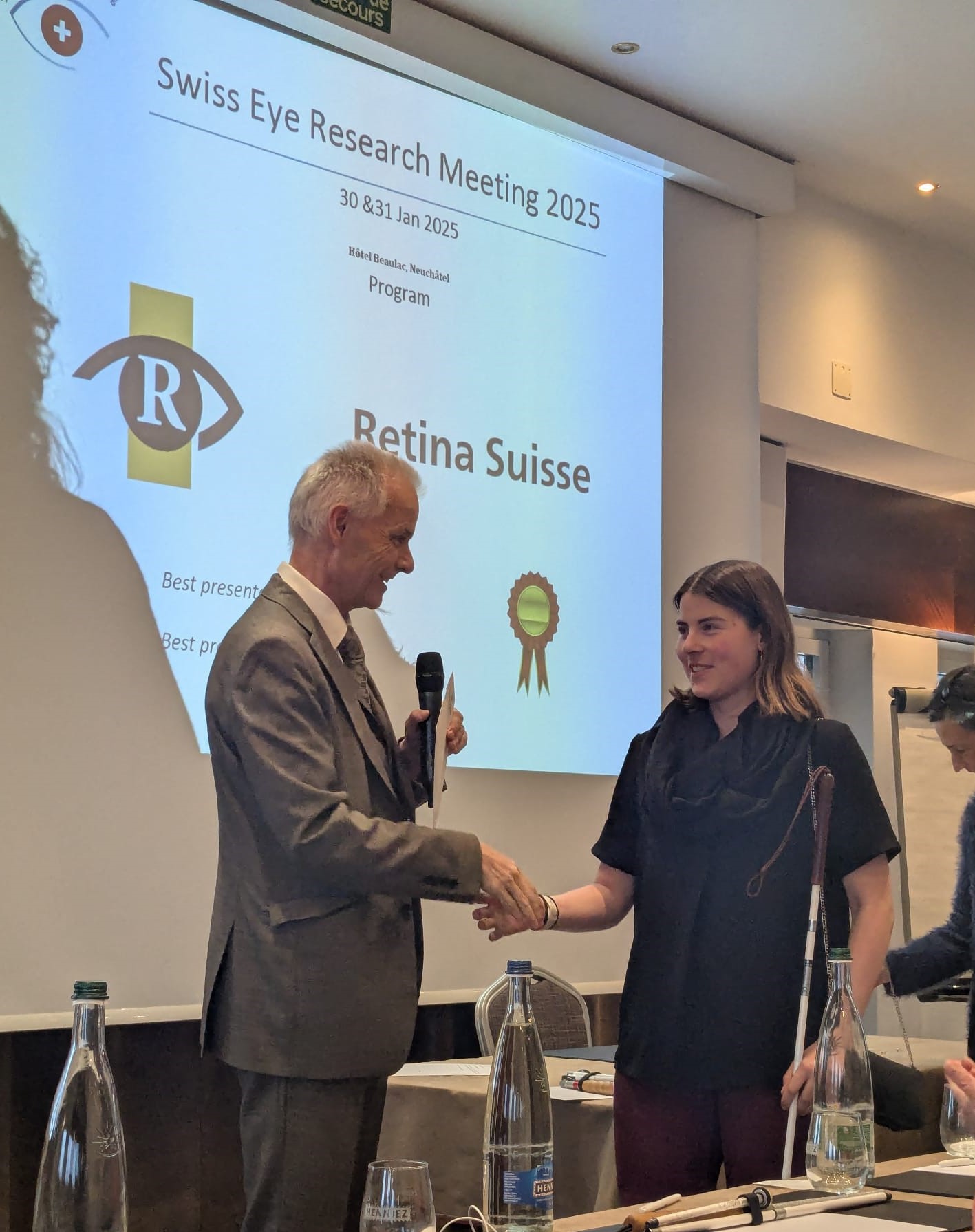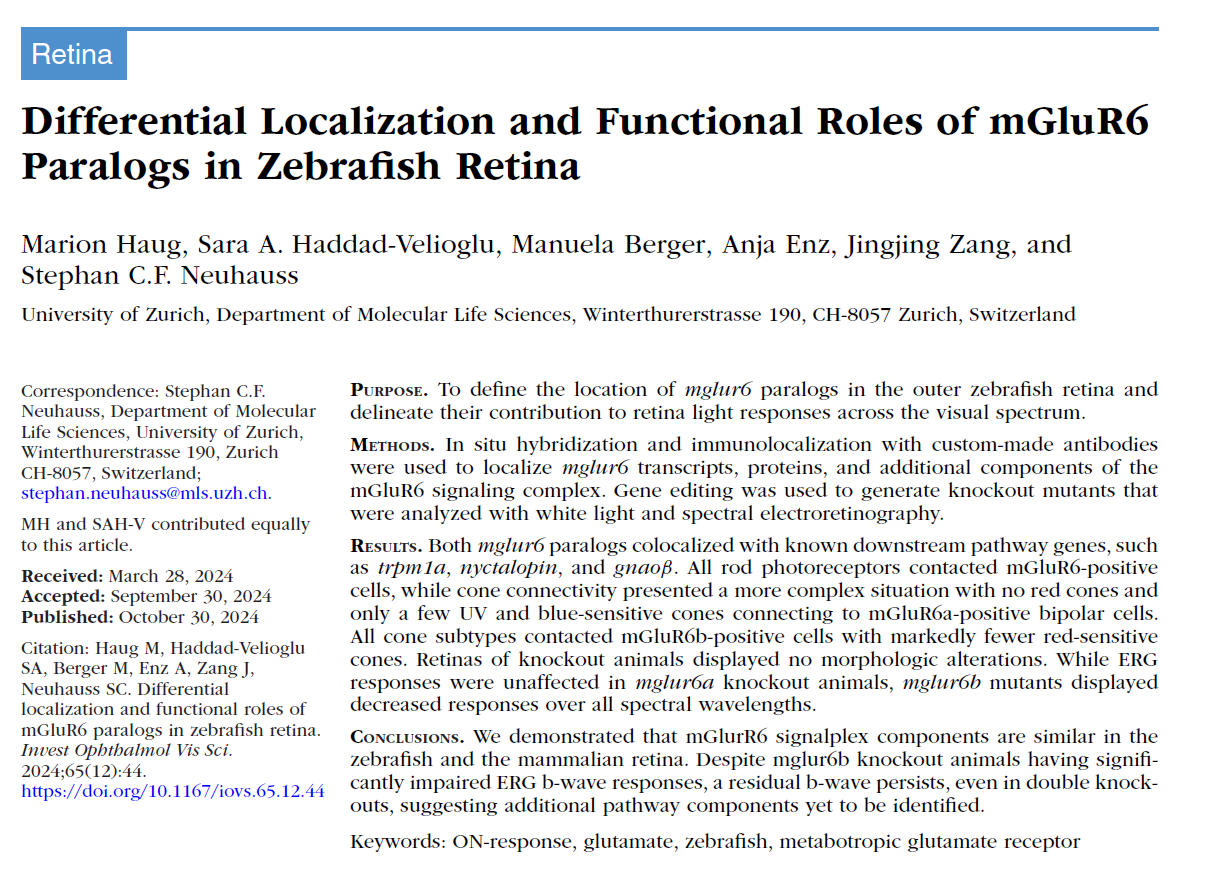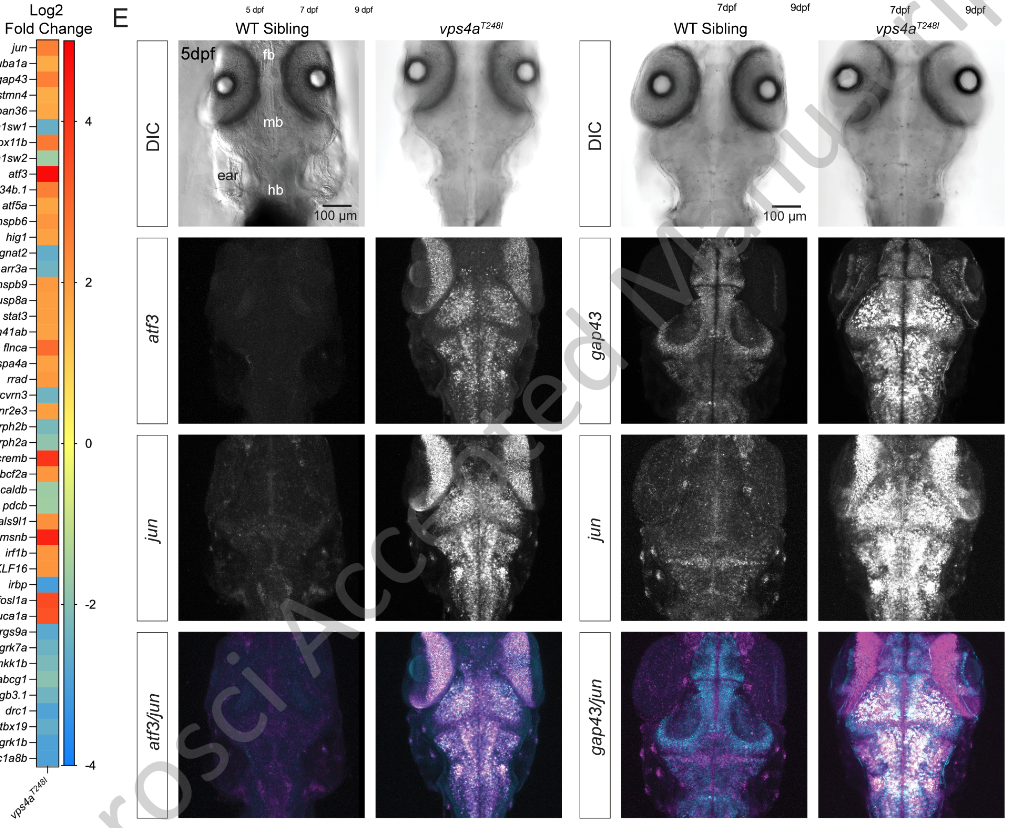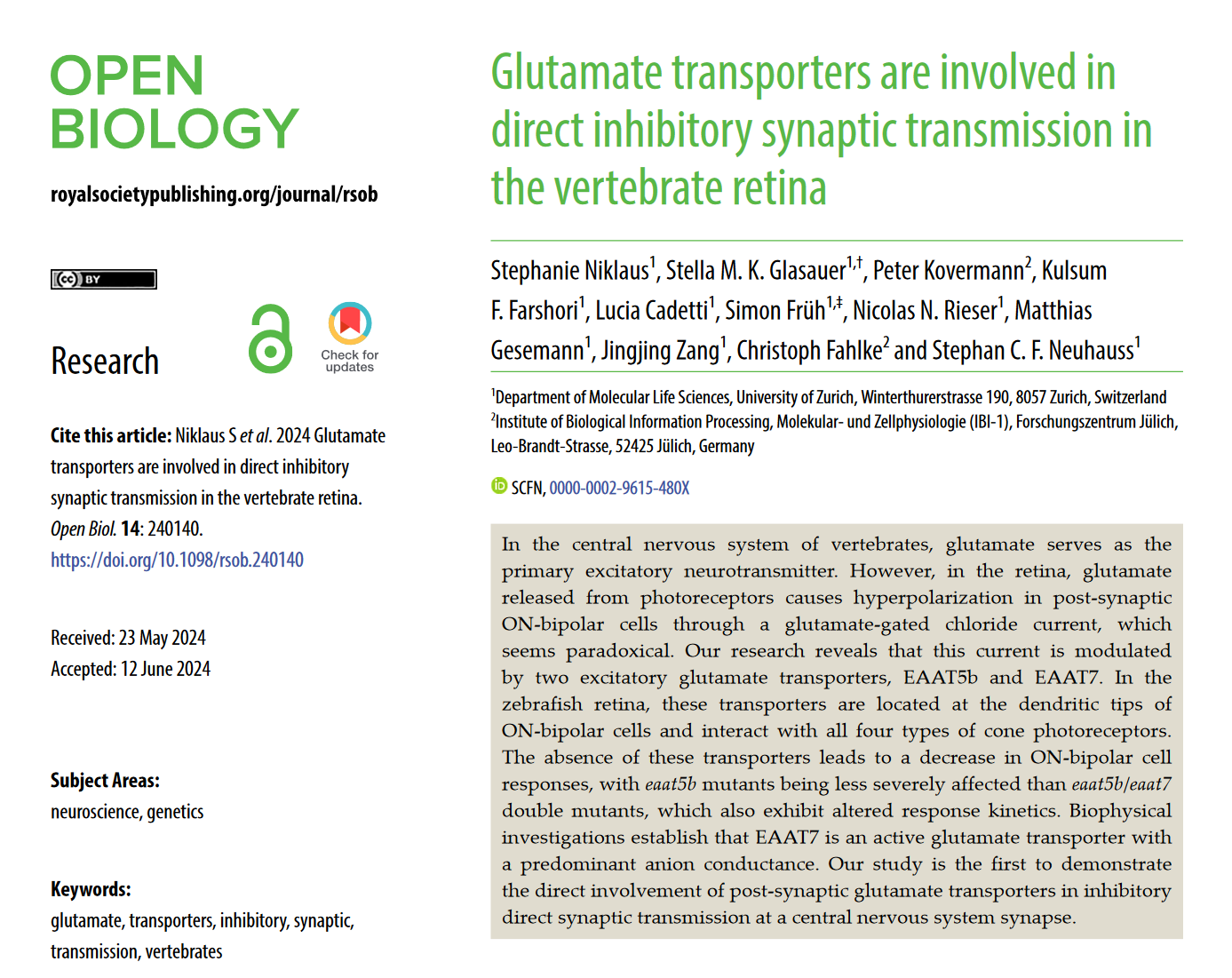News
January 2025

I am thrilled to announce that my graduate student, Jacqueline Kientsch, has been awarded the Best Presentation Award at the Swiss Eye Research Meeting by Swiss Retina! Jacqueline delivered her awarded talk on the necessity and biological mechanisms of metabolic support of photoreceptors.
I am all the more delighted since she is directly affected by the consequences of such a loss of metabolic support in the outer retina. What an achievement of resilience and passion for science! Congratulations, Jacqueline! You can be very proud of yourself.
October 2024

Latest paper out now in IOVS
We finally published a story that has been cooking (or baking) for some time. In our latest paper we show that the components of the mGluR6 signalplex that mediates the visual ON-response are conserved between the zebrafish and mammalian retina. Although ERG b-wave responses are markedly impaired in mglur6b knockout animals, a residual b-wave remains even in double knockouts, indicating the presence of additional, yet-to-be-identified pathway components. Surprisingly knocking out the other paralog mGluR6a did not show a phenotype, albeit the protein being found in many cone synapses.

New preprint from the Nicolson Lab with a contribution from our own Jingjing.
Mutations in human VPS4A are linked to motor delays and low muscle tone due to defects in membrane scission, but the precise mechanisms are unclear. In zebrafish, the vps4a T248I mutation reduces ATPase activity, leading to larger endosomal compartments and fewer exosomes in the brain. Electroretinogram (ERG) data show intensity-dependent retinal deficits, and calcium imaging highlights reduced activity in auditory pathway neurons. Although motor neurons and muscles remain functional, key reflexes—such as optomotor and vestibulospinal—are severely impaired. These findings suggest that disrupted sensorimotor transformation due to impaired membrane scission underlies the selective motor deficits in vps4a mutant zebrafish.
08.July 2024
New Master Thesis position! Position is taken.
Please check the details out under Master Thesis project in visual pigment recyling (PDF, 842 KB)
June 2024

Paper about the involvement of glutamate transporter in synaptic transmission out now in Open Biology.
In this paper we show a direct involvement of glutamate transporters (EAATs) in synaptic transmission. This unexpected finding shows that the excitatory neurotransmitter glutamate can acts as an inhibitory neurotransmitter at photoreceptor synapses.
17. June 2024
Position avaiable for a Master Thesis! Position is taken.
please check out the details under master thesis opportunity RaSMID project (PDF, 232 KB)
This thesis project offers a comprehensive learning experience in cutting-edge cancer research methodologies and the application of zebrafish models for biomedical research. Join us in advancing the field of pediatric cancer treatment.
7. May 2024
Congratulation "lets get fishical..." Well done!
The Neuhauss lab teamed up with the Bachmann lab and friends to participitate in the SOLA 24.
15.Januar 2024

We are proud to announce that our PhD student Ioanna Koutroumpa just won the best poster award at our departmental retreat (notice the slick QR code links on the poster, including an audio guide for the visually impaired).
Well done Ioanna!
August 2021

We made it to the 21th century!
We are finally using Twitter- please follow us for latest news and insights
March 2021
This month Jingjing’s extensive review on “Biochemistry and physiology of zebrafish photoreceptors” has been published in Pflügers Archiv – European Journal of Physiology, the oldest physiology journal of the world (luckily for Jingjing, it is not in German anymore). The review turned into a comprehensive piece of work with a whooping 222 references. Congratulations Jingjing, your paper will be a must-read for everybody interested in zebrafish photoreceptor biochemistry.
The review is open access at
https://link.springer.com/article/10.1007/s00424-021-02528-z

October 2020
It is our special pleasure to announce the inauguration of the Electrophysiology Facility, the latest addition to the technology platforms of the University of Zurich.
The facility is integrated into our laboratory space in Y13K52. It all started with a meeting of Professors Johannes Loffing (Institute of Anatomy), Felix Beuschlein (Clinic of Endocrinology), and Stephan Neuhauss (Department of Molecular Life Scienes) about two years ago. Now the facility, with the charming acronym e-Phac, is enthusiastically headed by Dr. David Pentos Ribas.
We are happy that we could launch this important core facility and already have our first customers. Check out our service at https://www.e-phac.uzh.ch/en.html.
June 2019

Farewell to Chiara (Cianciolo – Consentino)
It is time to say goodbye to Chiara.
She was the flame carrier for our kidney projects in our collaborations with Jan Loffing’s lab and even got lure into studying the cerebellum.
We will miss her dearly, her colorful healthy lunches, her sportive spirit, and the many nice conversations we had.
The sweetener is that she will stay in Zurich and has already started a collaboration between our lab and her new boss Javad Nazarian.
April 2019

Best presenter Award for Domino!
Congratulations to Domino. Last weekend she won the best presenter award at the 12th Swiss Zebrafishmeeting in Leukerbad. Amidst snow covered mountains she convinced the jury with her talk on “Studying the role of CACNAD2D4 in a rare form of retinal dystrophy”.
The prize was sponsored by the European Zebrafish Society (EuFishBioMed).
February 2019

Best presentation award at the Swiss Eye Research Meeting for Jingjing!
Congratulations to Jingjing. She just won the best presentation award at this year Swiss Eye Research Meeting in Lausanne. The well-deserved award was for her talk on “The Role of Circadian Rhythms in Regulating the Cone Phototransduction Cascade Shutoff in the Zebrafish Retina”. Well done Jingjing.

Filipe Viegas
In February, Filipe Viegas (Filipe Paulos e Cruz Oliveira Viegas to be precise) will start his PhD in our lab. Filipe is a Portugese native from Lisbon. He holds a Master degree in evolutionary and developmental biology from the University of Lisbon and worked previously with Drosophila. We are happy to have him join the team and help us to understand how neurons in the retina are energized.

Marco Garbelli
This February, Marco Garbelli will join our team. Marco holds a Master degree in Molecular Biology of the Cell from the University of Milan. Coming from the lab of my former colleague from (long past) student days Prof. Salim Seyfried, he has already ample experience with zebrafish and imaging. He will now use his skills to understand glutamate signaling in the retina.
Review Jingjing
In this recent review Jingjing highlights the latest on our favorite Calcium-binding protein Recoverin. This negative regulator of the visual transduction cascade has more to offer than just a calcium-dependent binding to G-protein-coupled receptor kinases. We discuss recent results that hint a functions beyond this well described interaction and highlight functional differences in rod and cone visual transduction. Find the paper in Frontiers in Molecular Neuroscience at: https://www.frontiersin.org/articles/10.3389/fnmol.2018.00473/full
Paper Marion
Our latest paper by Marion was just published in Histochemistry and Cell Biology. In another tour-de-force analysis, Marion showed that the common histochemical marker for On-bipolar cells (Phosphokinsase C) shows a more complex expression in the retina. Only a subset of bipolar cells are labeled with this marker and the commonly used commercial antibodies recognize more than one Phosphokinase isoform. These data provide a cautionary note on the interpretation of many published and ongoing studies of inner retina cell identification.
Find the paper at: https://www.ncbi.nlm.nih.gov/pubmed/30604284
January 2019

David Penton Ribas joins our lab as an expert electrophysiologist
David will take over our electrophysiology and cell culture laboratory. We hope that this is the seed of building an electrophysiology core facility that not only our team, but also colleagues from the Science and the Medical faculty can benefit from. We are happy that he is now part of our team- Welcome David!
October 2018
A warm welcome to our new Team-members!
Maria Andreea Dimitriu, External Master Student in the Neuhauss Lab
Ashwini Kedari, External Master Student in the Bachmann Lab
Irmak Cabas, External Master Student in the Bachmann Lab
Nadja Greter, Internship Student in the Bachmann Lab
September 2018
Welcome Sabina Steiner

Starting in Sommer 2018, Sabina Steiner, will care for the administrative needs of our group. She has not lost her smile after being confronted by the multiple needs of four professors, spanning everything from personnel administration, finances and teaching related work. Keep on smiling, we are very happy to have you on board.
new Paper out
The latest paper in our series combing phylogenetics with a detailed in situ expression histological analysis. Marion’s recent paper focused on protein kinase C variants in the brain. These central signaling molecules are well conserved among vertebrates and Marion provides an unprecedented detailed expression profile over the whole developing brain. Read more and enjoy the beautiful in situ hybridization images in the Journal of Comparative Neurology.
Comment
A brief commentary on a beautiful paper from the Baden lab, published in Current Biology, showing that the larval zebrafish retina is structurally optimized to match the visual ecology of their habitat. Enjoy the LSD inspired figure designed by Matthias.
https://www.sciencedirect.com/science/article/pii/S0960982218306225?via%3Dihub
Goodbye Irene

After more than ten years of managing our group Irene Hofmann is leaving the institute to work in Lucerne. She was our most skilled pilot in all administrative issues, helping us to navigate the labyrinth of university administration and always with a rescue plan, when we got stranded. We will miss you dearly and wish you a great start in Lucerne.
August 2018

Michele Hari is our most recent proud graduate from our Master in Neuroscience Program. We will miss her laugh during lunch time, exercising and partying together and so much more. All the best with starting the next career step.

Farewell André
André Lehnherr, another long time student of us is leaving to bring narcoleptics with a novel mode of action to market. He will start as Medical Science Liaison at Recordati. With André we lose not only a brilliant experimentalist, but also one of the pillars of our lab’s social life. We will miss also his fantastic home brews that easily rank among the best craft beers available anywhere.
July 2018

Bye Bye Steffi...
It is time for Stephanie Niklaus to move on. After doing her Master thesis and her PhD with us, Steffi was snatch up by Roche Pharmaceuticals. This is a loss for academia, but we are proud that she will bring her expertise in zebrafish genetics and visual diagnostics to the pharmaceutical industry. Our team will lose on the most active members and we will struggle to replace your expertise of basically all we do in the lab. The lab will feel different without you and your treats from Graubünden. We wish you all the best for your next challenge and hope that we both can help to bridge the industrial/academic divide.

UZH Forschungskredit
Congratulations to Adriana Hotz. Her proposal to use a zebrafish mutant to model epilepsy was awarded the prestigious CandDoc Forschungskredit Award of the University.

Anja Enz recently graduated with her Master’s degree and will start as a junior consultant at Kelly Services soon. Congratulations and all the best for her future endeavors. We will miss one of our most avid sports companions.
May 2018

Sanne spend six months in the lab to be trained in electroretinography and other fishy business. She is now back in Nijmegen at Radboud University. We will miss you Sanne - it was a pleasure to have you with us! This half a year went way too fast...
January 2018
Children University-Sunburn and fish
There is a nice article ( in german ) about the childern University in the Tagesanzeiger.
http://www.tagesanzeiger.ch/zuerich/stadt/was-kinder-von-fischen-lernen-koennen/story/20578228
Prof. Dr. Stephan Neuhauss is this year again a lecturer at children University. One of his topics: Can fish get a sunburn?
December 2017
Congratulations Dr. André Lehnherr

Congratulations to André, after finishing his final PhD exam with flying colors. The event was celebrated in style, lubricated by his other biological interest, namely taming yeast to produce a number of excellent home brews.
All the best for your future, your Neuhauss-team
July 2017
Stephan Neuhauss the new Vice-Dean for Research and Planning
Congratulations (or Condolences) to Stephan for being elected to become Vice-Dean for Research and Planning of the Faculty of Science, beginning in August 2017.
Good luck and may you make more new friends than enemies.
Congratulations to Stephanie (Steffi) Niklaus

Steffi defended her thesis with flying colors, leaving her committee speechless.
All the best of fun for the well-deserved extend trip around the world.
We are happy that you will not leave us yet and will come back to finish and write even more papers.
Proud "Doktorvater" and your team
Latest Publications
Fish Larvae on Cocaine
Steffi just published the curious finding that cocaine accumulation in the zebrafish eye leads to an increased response of the retina to light. This may be related to changes in light adaptation connected to dopamine signaling. Find the open access link to this single observation see open access at:
Cocaine Accumulation in Zebrafish Eyes Leads to Augmented Amplitudes in the Electroretinogram
Glutamate Transport at the Photoreceptor Synapse Shape Neurotransmission
With perfect timing just before the submission of her thesis, Steffi, Lucia and friends got the long awaited EAAT2 story published. These two paralogs of glutamate transporters represent prime example of subfunctionalization of an ancient gene function. They found that glial-expressed EAAT2a is the main glutamate sink at the cone photoreceptor synapse. EAAT2b in turn is expressed on cone photoreceptors, sporting a large anion leak current, effectively clamping the photoreceptor resting potential. Read the paper for free clicking the link below.

Shaping of Signal Transmission at the Photoreceptor Synapse by EAAT2 Glutamate Transporters.
Niklaus S, Cadetti L, Vom Berg-Maurer CM, Lehnherr A, Hotz AL, Forster IC, Gesemann M, Neuhauss SCF.
Evolutionary Conservation in the Vertebrate Kidney
Our former PhD student Yuya Sugano published yet another paper from our fruitful collaboration with the Loffing lab from the Institute of Anatomy. In this paper he shows that gene expression is conserved between the mammalian distal convoluted tubule and the zebrafish distal late segment. Interestingly some genes enriched in the mouse are not found to be enriched in the zebrafish. Instead, related homologous genes from the fish are enriched, likely fulfilling a similar function.
Comparative transcriptomic analysis identifies evolutionarily conserved gene products in the vertebrate renal distal convoluted tubule.
Sugano Y, Cianciolo Cosentino C, Loffing-Cueni D, Neuhauss SCF, Loffing J.
Pflugers Arch. 2017 Jun 27. doi: 10.1007/s00424-017-2009-8
June 2018
Congratulations Dr. Irene Ojeda Naharros

Congratulations to Irene Ojeda Naharros, our newly minted Dr.sc.nat.
Triple digits of hours tracking fluorescent particles in photoreceptor cells have paid off.
All the best of luck for your postdoc and your growing family!
Congratulations to Selin Ozgur

Selin finished her Master in Genetics this May working on camta1 mutants. We will miss your ready smile and your comedian’s talent that made our lunch breaks. All the best for your graduate school applications.
May 2017
New webpage for the group of Ruxandra Bachmann

Ruxandra Bachmann has a new homepage:
http://www.medgen.uzh.ch/en/forschung/Research-Group-Bachmann-Gagescu.html
Congratulations Ruxandra Bachmann!!!

We are proud and happy to report that Ruxandra got awarded the very prestigious SNF Förderprofessorship of the Swiss National Science Foundation. From this fall on she will be an independent assistant professor at the Institute of Molecular Genetics. Luckily she will continue to be associated with us via her fish work. Incidentally I started my academic career with the same professorship. Congratulations and all the best for starting your completely independent research team.
2016

Congratulation Dr. Stella Glasauer
Proud „Doktorvater“ with Stella Glasauer at the graduation ceremony in October 2016
It's over - 2nd European Meeting on Phototransduction

The 2nd European Meeting on Phototransduction which took place in September 2016 on the beautiful Monte Verita in Ascona was a full success. The 50 participants from 12 different countries presented and discussed photoransduction in all its depth from biophysical properties to evolution and diseases.
Yuya Sugano: best thesis prize- Swiss society for anatomy

Yuya Sugano was awarded the best thesis prize at the annual meeting of the Swiss society for anatomy. Congratulations to this well-deserved honor.
Some part of the thesis is published in Kidney Int. 2015 Nov;88(5):1047-56 (Sugano et al; The Rho-GTPase binding protein IQGAP2 is required for the glomerular filtration barrier)
2nd European Meeting on Phototransduction

2nd European meeting on Phototransduction from September 04 - 07, 2016 to be held at the Conference Centre Monte Verita in Switzerland
https://www.uni-oldenburg.de/2nd-emp/
- Organizers:
- Stephan Neuhauss
- Karl-Wilhelm Koch
Stella Glasauer
cover Journal of Comparative Neurology Vol.524 / No.12
http://onlinelibrary.wiley.com/doi/10.1002/cne.24049/epdf
new paper out
mglur6b:EGFP Transgenic zebrafish suggest novel functions of metabotropic glutamate signaling in retina and other brain regions
full article:
http://onlinelibrary.wiley.com/doi/10.1002/cne.24029/full
ncbi database:
https://www.ncbi.nlm.nih.gov/pubmed/27121676
2015
Jingjing Zang
cover in Open Biology 2015 August
http://rsob.royalsocietypublishing.org/content/5/8
http://rsob.royalsocietypublishing.org/content/5/8.cover-expansion
2011
The Neuhauss Lab on TV
SRF Einstein Episode from 21.04.2011 about Zebrafish science in Zurich.





